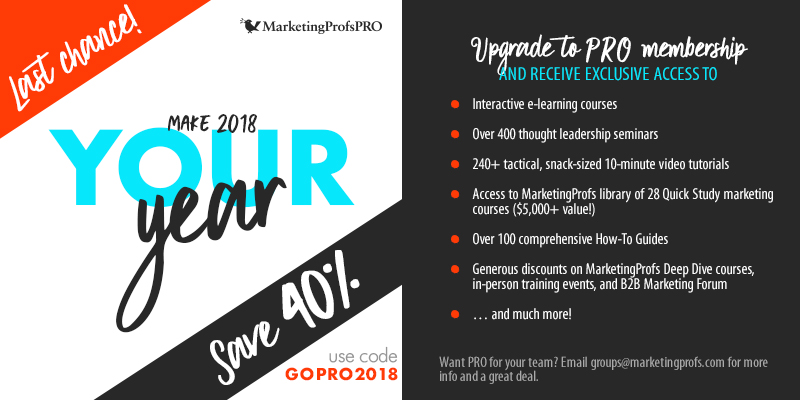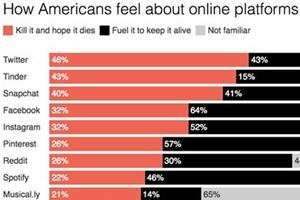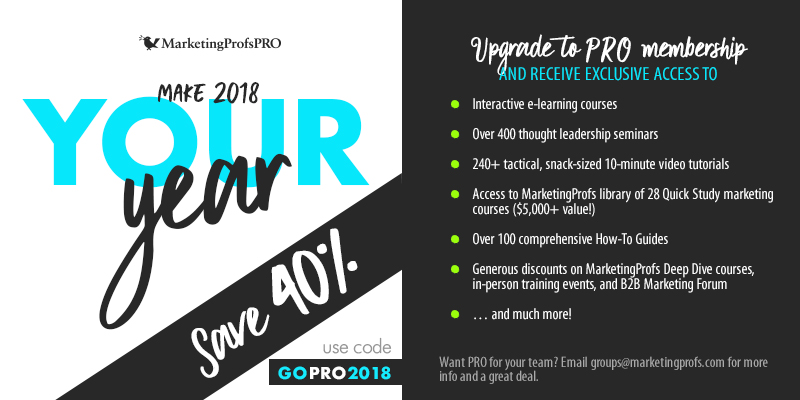This week's 'Skim: why marketers and brands should beware of Facebook's biggest algorithm change in years; LinkedIn fires up an unconventional ad campaign to get people thinking differently about the platform; Facebook unveils major new drive to compete with Amazon Echo devices and Google Home; America's love-hate relationship with social networks, and which ones they want to see gone forever; why LinkedIn has new competition in Ripple, a professional networking app spinoff from Tinder; the reason leaked Snapchat data paints a dark picture of the app's future, and why marketers would rather advertise on Instagram; how to create social campaigns that engage and get attention; the new social network dedicated to breaking the echo chamber; and much more... The social network will start surfacing posts that your friends have engaged with—such as a status update that many of them have reacted to or commented on—more so than posts from media companies. The dislike softens a bit for Facebook, with only 32% hoping the social network disappears, whereas 40%, 32%, and 26% of respondents hope for the demise of Snapchat, Instagram, and Pinterest, respectively. Now go be... professional! The most depressing data point? Facebook says it'll use learnings from M to power other AI endeavors, so the project wasn't a total loss of time and investment—even if you never saw it. Snapchat continues to shine among younger demographics, but 96% of respondents to the Cowen survey—50 senior American ad buyers asked to rank social networks—prefer Instagram Stories to Snap Ads. All of which leads us to one conclusion: Creating great content and engaging users isn't easy, but marketers can't simply walk away from it all, because consumers will remain where they are. But how can a brand create video content that works well with YouTube's algorithm to maximize performance? It launched in the App Store last week The app asks users to submit short, debate-format videos of themselves defending their positions on anything ranging from Net Neutrality to the merits of a basic universal income.


This week’s ‘Skim: why marketers and brands should beware of Facebook’s biggest algorithm change in years; LinkedIn fires up an unconventional ad campaign to get people thinking differently about the platform; Facebook unveils major new drive to compete with Amazon Echo devices and Google Home; America’s love-hate relationship with social networks, and which ones they want to see gone forever; why LinkedIn has new competition in Ripple, a professional networking app spinoff from Tinder; the reason leaked Snapchat data paints a dark picture of the app’s future, and why marketers would rather advertise on Instagram; how to create social campaigns that engage and get attention; the new social network dedicated to breaking the echo chamber; and much more…
Skim for a new point of view!
1. Facebook announces biggest algorithm change in years
Over the next few weeks, Facebook is set to implement the biggest overhaul of its algorithm in years, exposing users to more content from friends and family and less from brands and publishers.
The social network will start surfacing posts that your friends have engaged with—such as a status update that many of them have reacted to or commented on—more so than posts from media companies.
The algorithm change will have far-reaching implications for businesses and publishers (hello, again, decreased reach), and will likely have brands even more dependent on paid media on the social network. But the modification also brings with it questions of whether it could amplify the echo chamber if users are exposed to content only their friends are interacting with.
Zuckerberg says a new emphasis on posts from friends rather than viral videos will benefit not only users’ mental health but ultimately the company’s business goals.
2. LinkedIn repositions with unconventional ad campaign
If you caught the Golden Globes last week, you may have noticed an unconventional ad from an even more unconventional advertiser: LinkedIn.
The professional social network is no newbie to award show spots (it launched its first TV ad campaign during the 2016 Academy Awards), but this year’s took viewers by surprise with its messaging.
Under the tagline “In It Together,” the spot seems to shake the social network’s professional, white-collar stereotype by featuring LinkedIn users who don’t necessarily fall in line with what we’d normally expect to see there. It highlights mixed-martial-arts fighters and ranchers in a black-and-white, documentary-style fashion, pushing viewers to think of LinkedIn as more than a place for corporate, sedentary professionals chained to desks.
Check it out, below!
3. Facebook plans big dive into home device market with ‘Portal’
Consumers will start seeing Facebook invade their homes in new ways if the social network has its way. In May, the company plans a formal product unveil of Portal, a video-chat device with other social features, including integration with Spotify and Netflix and recognition of users’ Facebook profiles—and it will be controlled with voice commands.
The device, set to ship in the second half of 2018, should be the first brainchild to emerge from Facebook’s hardware lab, Building 8. The price of Portal? $499, a hefty increase over that of Amazon’s Echo Show, so we’ll see whether Facebook can make further headway into Middle America with a price point like that.
4. Americans’ love-hate relationship with social media is complicated but telling
Some 183 million Americans and Canadians use Facebook every single day, but that doesn’t necessarily mean the social networks intertwined with their daily lives are ones they love. In fact, a recent Harris Poll finds that some of the most popular platforms are ironically the most divisive, and it provides insights about which platforms are still unknown to large segments of America.
Twitter might have 330 million monthly active users, but 46% of those surveyed would prefer to “kill it and hope it dies,” in the…

COMMENTS